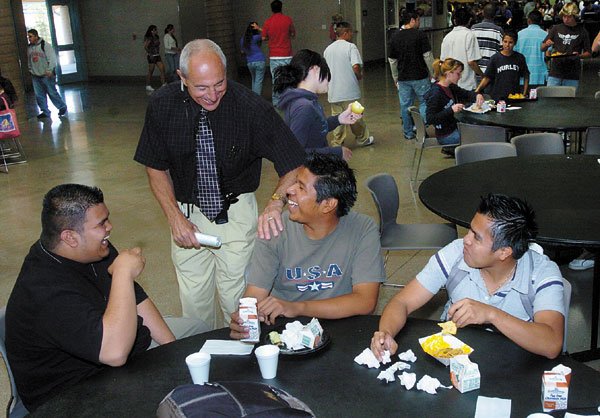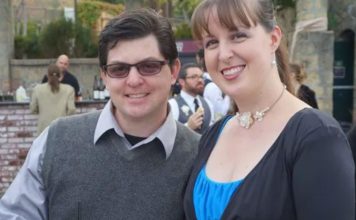After 34 years as a tireless educator and role model for at-risk
students, Mani Corzo will retire
– or try to retire – for the second time.
Gilroy – After 34 years as a tireless educator and role model for at-risk students, Mani Corzo will retire – or try to retire – for the second time.
The 61-year-old dean of students will leave Gilroy High School – where he started as a Spanish teacher in 1973 – at the end of the school year. Wanting to spend more time with his family, Corzo planned to retire in 2006 but was convinced by high school and district staff to stay for an additional year. He spent his entire career in education at the high school.
“I’m a faithful worker, I guess,” he said. “I started here and I ended up here.”
The School’s Star Point Guard
Growing up in Madrid, Spain, Corzo never imagined himself as a Gilroyan or an educator. He was determined to play point guard for a Spanish basketball team. However, something or someone was determined to keep him from that dream and to make him a teacher in Gilroy, he said.
He found early success in the sport, both in Spain and in America. He came to the country as an exchange student when he was 17 with the goals of learning English and playing his senior year on a U.S. high school basketball team. As a starter for Menlo-Atherton High School, he was on his way to accomplishing those goals when, in the third game of the season, he went up for a rebound and fell. An opponent crashed down on him and crushed his right forearm, leaving scars where the bones penetrated the skin.
While this knocked Corzo out for the remainder of the season and reduced the accuracy of his shots, it did not stop him from pursuing his dreams. He still studied English and, staying on in America to get bachelor’s degrees in business and Spanish at San Jose State University, played basketball and soccer at the collegiate level.
In 1970, he moved back to Spain and began playing for a team in Bilbao, on the north coast of the country. After three years there and a year in Barcelona, he married a woman from San Rafael who he had met during his time in the United States. While he had been earning a comfortable living and his career was starting to pick up, she did not like Barcelona and gave him an ultimatum – America or divorce. They moved to California when the season finished in 1973.
It was a clear sign, Corzo said.
“Somebody didn’t want me to be involved in basketball,” he said.
An Unlikely Teacher
In returning back to America, Corzo went from heralded to undesirable. Not only did he no longer have a job in the limelight or receive a handsome salary, he was not a United States citizen so companies would not hire him.
Eventually, friends who were coaches and teachers with local school districts convinced him to submit his resume to the Gilroy Unified School District. A high school Spanish teacher had just quit and Corzo was hired after a whirlwind two days of interviews.
“All of a sudden I got this break here,” he said.
In September of 1973, Corzo taught his first Spanish class. The profession grew on him and he ended up spending 29 years in this position. The key to a successful class was entertaining the students and letting them know he was behind them, he said.
“I don’t think kids at this level want to know how much you know about the subject,” he said. “They want to know how much you care first.”
Thanks to his energy and responsible nature, he was promoted to assistant principal in 2001. As part of a compromise last year to keep him from leaving, his hours were reduced and he was made dean of students.
During his time in education, he coached soccer at the high school for 11 years and at Gavilan College for four years. Teaching sports allowed him to connect to his students in a different way than he did in the classroom.
“You’re not only training the kids to practice a certain sport to win games,” he said. A coach teaches players “mentally and morally to do the right thing.”
Suspension, with Care
Central to leading kids to develop sound morals and integrity is Corzo’s tough love policy – a tenet for which he has developed a reputation. This has been put to the test this past year when he became the primarily disciplinarian at the high school. Yet, he enjoys the continued respect and admiration of students – including those with the most disciplinary and academic problems – thanks to his willingness to forgive.
“Even though I might have to suspend you, I suspend you with care,” he said. “It doesn’t mean I don’t like you when you come back.”
Corzo has seen an increase in disciplinary problems during his career because parents are progressively taking less responsibility for teaching their children good behavior, he said.
“Education used to be done at home,” he said. “Instruction used to be done in school. Teachers didn’t have to be 50 percent social workers and 50 percent teachers like they are now.”
Corzo recognizes that this shift away from discipline at home is not the students’ fault and gives them chances to redeem themselves after they make mistakes. This approach also stems from having had his own academic problems as a teen and needing all the chances teachers would afford him.
“I identify more with those who are struggling,” Corzo said. “I struggled through school. My brother was the genius and I wasn’t.”
While students might not see his struggles, they understand that he cares.
“He has to do his job, but he’s cool about it,” said 10th-grader Jacob Gonzalez. “Even when he’s writing me up (for disciplinary problems), he’s still cool about it.”
To be able to get this kind of a response from students is unusual, said principal James Maxwell.
“As a disciplinarian, it’s a rare gift to suspend them and have them say thank you in the long run,” he said. “Personality-wise, he’s hard to replace.”
While Corzo put off retirement last year, he plans not to have this dream pushed out of reach. He wants more time to spend with his two stepdaughters, his two grandchildren and his third wife, Gail – a field manager at Christopher Ranch.
However, Corzo will not leave education completely. He hopes to be an administrator three days a week or do consulting work part-time.
In the end, any parting with the high school will be bittersweet, he said.
“I see the kids here – they need a lot of help and I think for most of them if anything, it’s been positive for them and for me.”















